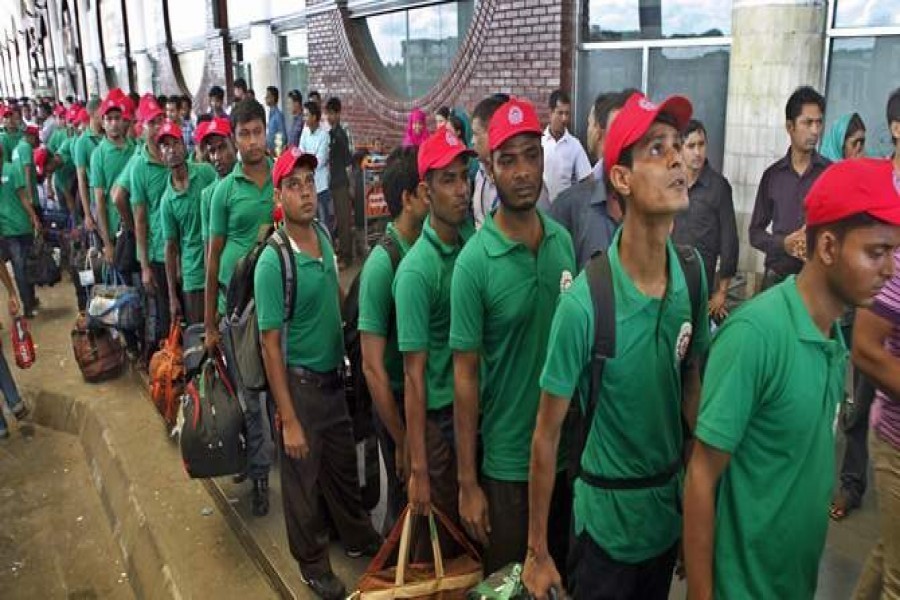On August 26 last, 109 women who went to Saudi Arabia as domestic help returned home. Actually they were compelled to return. In the past eight months about 800 such domestic workers have come back from Saudi Arabia alone. Last year the number of the returned women migrant workers stood at 1,353. One of the returnees disclosed that about 400 of them were staying at the safe home of the Bangladesh mission in Saudi Arabia. Only women workers who can complain to the Bangladesh mission of the inhuman treatment they are subjected to are rescued and sheltered at the safe home before sending them home.
At least those who could return home can count them lucky for escaping the torture. One of the returnees was so desperate that she jumped from the first floor in order to flee the ordeal but instead ended up in a hospital in Riyadh, where she spent two months before her admission to the safe home. Many such returnees have such horrific stories to tell. And it is not the migrant women workers in Saudia Arabia alone, many of those who have gone with similar works to Qatar, United Arab Emirates and other Middle-east countries have to go through similar harrowing experiences.
Their horror, violence -physical and sexual -and abuses is a modern-day saga no less demeaning than the 19th century slavery in America. With high hopes of earning foreign currencies these poor women travel to an unfamiliar land and return paupers and devastated. Stories have it that not all of the tortured domestic workers have access to cell phones and they live a life of captives. They cannot reach the Bangladesh mission, far less inform it of their plight.
Poor and mostly illiterate, women workers' greatest problem is language. Although one month's training for women is mandatory before their migration, it is hardly enough for them to communicate with their employers. Some also leave without the training. The question of speaking a third language does not at all arise. They must learn the language of their employers and mastering it is not easy for them. The next problem they face is the change of job. They go with one type of job but some of them are asked to do something different. The manpower agencies are mostly responsible for this.
That migration of women workers to Middle East countries has ever remained a thorny issue is clear from the fact that the Philippines and Indonesia stopped sending their women workers to Saudi Arabia on complaints of physical torture. It is against such a background, Riyadh reached an agreement with Dhaka on migration of women domestic workers to that country in 2015. Since then about 0.3 million women workers have gone there by July last.
The migration of such a large number of women also proves that the majority have adapted to the conditions and most of them are doing fine. Not all employers are used to abusing their domestic helps. This points to the fact that there is a need for joint scrutiny and monitoring of the condition of employment and employers' residence to know if the environment is safe for a woman there.
In this connection, Prime Minister Sheikh Hasina's directive at the first meeting of the national steering committee on migration as its chief deserves special mention. She directed the authorities concerned to strengthen monitoring and also launch extensive campaign so that intending migrants are not deceived and fall into trap. She pointed out that her government has set up 5,275 digital centres for registration by people willing to migrate. Still, she lamented, people were duped into illegal migration by some dubious agencies. Middlemen lure intending migrants into their trap and most often suffer inhuman ordeals. Some find themselves without food or drinking water in floating boats off the coast of Libya or Tunisia and others in the wilderness of Thailand, Singapore or Malaysia.
Clearly, the need is to make migration cent per cent transparent. Not a single soul will leave the country without the knowledge of the relevant authorities under the Ministry of Expatriates' Welfare and Overseas Employment. Those who lure youths into hazardous journeys abroad cannot evade detection if the law enforcement agencies are made particularly responsible for keeping a close vigil on them.
The news that 10 people from Shariatpur alone were killed in South Africa in the past three years created quite a furore. But another report says that migrants from Bangladesh are taking undue advantage to land there through illegal channels. South Africa is not a lucrative destination for employment because its native people are desperately looking for jobs. There are reasons for social tensions for cultural difference and conflicting interests. It is against such a backdrop, Bangladeshi traders are targeted for attacks.
Evidently, if migration everywhere could be made a matter of informed decision by the ministry concerned, all such fracas, mishaps and tragedies could be avoided. Regulation of the manpower agencies therefore is a priority. The ministry should then take the responsibility for devising bilateral arrangements in order to avoid misplaced migration.


